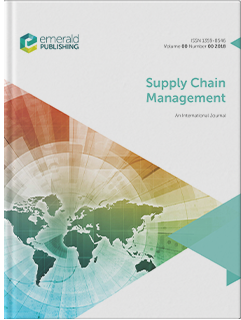全球供应链的弹性:分析重大中断引发的响应、恢复行动和战略变化
IF 8.4
3区 管理学
Q1 BUSINESS
Supply Chain Management: An International Journal
Pub Date : 2023-06-08
DOI:10.1108/scm-01-2023-0020
引用次数: 0
摘要
重大和频繁的中断是否正在改变全球供应链?本研究旨在从供应链弹性(SCRES)的角度探讨跨国公司(MNCs)如何应对近年来积累的重大中断现象以及不稳定条件和环境不确定性的合理新范式。本研究采用基于解释现象学的归纳解释主义方法,通过半结构化访谈收集了十家跨国公司供应链经理和国际顾问的见解,他们作为关键信息提供者参与其中,分享了他们对这一现象的经验。此外,数据收集还使用了新闻稿、媒体文章和行业报告等二手来源。研究结果包括五类恢复行动,即平衡,配给,缓冲,桥接和边界重新定义,竞争优先级的关键战略变化,内部组织和协调结构,以及SCRES特征之间的层次结构,整合在连接这些结构的经验衍生概念框架中。这有助于在SCRES知识体系中形成中游理论。作者还确定了未来SCRES研究的一系列领域。研究结果可以帮助跨国公司的供应链专业人员设计和管理有弹性的全球供应链,基于从最近高度破坏性的环境中吸取的教训,特别是在恢复行动和弹性建设战略变革方面,有助于全球供应链的敏捷性和稳健性。在SCRES研究中,非实证主义的解释和归纳作品很少。通过在这一领域采用这种新颖的方法,作者扩大了之前作品中使用的反应分类,并确定了突出的战略变化和SCRES特征以及构式之间的关系,从而在研究的背景下为SCRES研究带来了概念上的清晰度。本文章由计算机程序翻译,如有差异,请以英文原文为准。
Resilience in global supply chains: analysis of responses, recovery actions and strategic changes triggered by major disruptions
Purpose Are major and frequent disruptions transforming global supply chains? This study aims to investigate how multinational companies (MNCs) are responding to the phenomenon of accumulated major disruptions in recent years and plausible new paradigm of unstable conditions and environmental uncertainty from a supply chain resilience (SCRES) perspective. Design/methodology/approach Following an inductive interpretivist approach based on interpretive phenomenology, this study gathers insights from ten MNCs supply chain managers and international consultants who participated as key informants via semi-structured interviews, sharing their experience of the phenomenon. Additionally, secondary sources such as press releases, media articles and industry reports were used for data collection. Findings Findings include five categories of recovery actions, i.e. levelling, rationing, buffering, bridging and boundary redefining, key strategic changes in competitive priorities, internal organisation and coordination structures, and a hierarchy between SCRES characteristics, integrated in an empirically derived conceptual framework connecting these constructs. This contributes to middle-range theories within SCRES body of knowledge. The authors also identify a set of areas for future SCRES research. Practical implications Findings can support MNCs’ supply chain professionals in designing and managing resilient global supply chains, based on learnings from the recent highly disruptive environment, particularly, regarding recovery actions and resilience-building strategic changes contributing to agility and robustness in global supply chains. Originality/value Non-positivist interpretive and inductive works are scarce in SCRES research. By adopting this novel approach for this field, the authors broadened the categorisation of responses used in previous works and identified prominent strategic changes and SCRES characteristics and relations among constructs, thus bringing conceptual clarity to SCRES research within the context of the study.
求助全文
通过发布文献求助,成功后即可免费获取论文全文。
去求助
来源期刊
CiteScore
16.70
自引率
5.70%
发文量
27
期刊介绍:
Supply Chain Management (SCM) is a journal that places great emphasis on research findings with international relevance and global impact, benefitting both theory and practice. To be considered for publication, research papers and case studies submitted to SCM must contribute to extending supply chain knowledge beyond a dyadic perspective.
The journal focuses specifically on empirical research and does not accept submissions related to modelling or simulation. This is because the challenges posed by globalization and rapidly evolving technology trends have a direct impact on supply chain design and management. Therefore, it is essential for contemporary supply chain practices to be responsive, proactive, integrated, and driven by information when managing the various components of the supply chain.

 求助内容:
求助内容: 应助结果提醒方式:
应助结果提醒方式:


